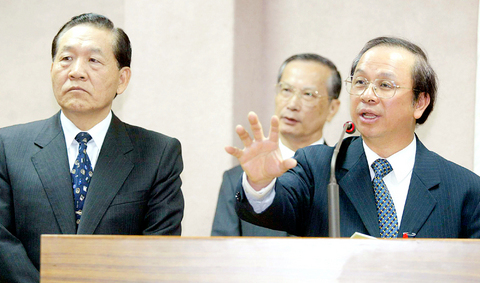The Industrial Development Bureau and the state-owned China Shipbuilding Corp (CSC) yesterday said that Taiwan is able to build submarines with a transfer of key US technology, but the Ministry of National Defense said the US would not help Taiwan do so.
But several legislators yesterday strongly criticized the government for "having no strategy" to promote the nation's submarine-building capability.
"Korea, Pakistan, Greece and Spain all built their own submarines, so why can't a technologically-advanced Taiwan do it too?" People First Party (PFP) Legislator Lin Yu-fang (

PHOTO: LIN CHENG-KUN, TAIPEI TIMES
"Taiwan's defenses have relied too much on the US, and the government has failed to enhance its defense industry," PFP Legislator Nelson Ku (
But bureau officials were more upbeat.
"A cross-ministry task force has reached the conclusion that the CSC is almost able to build submarines without large-scale investment in its shipbuilding equipment," Industrial Development Bureau director Chen Chao-yi (陳昭義) told the legislature. "However, the US' provision of submarine blueprints and submarine weapons systems are two prerequisites."
Chen said the task force requested that the defense ministry negotiate with the US over the purchase of eight submarines, in which Taiwan would send personnel to observe the building of two submarines in the US, then build one-third of the third and fourth submarines, two-thirds of the fifth and sixth submarines, and the seventh and eighth vessels in their entirety.
Fan Kuang-nan (范光男), acting chairman of the CSC, said that the company was looking forward to building submarines for the navy.
"The company has assessed that it only has to spend NT$1 billion on equipment to build the submarines," he said.
However, Vice Minister of National Defense Huo Shou-yeh (霍守業) said the US does not support the idea of US-Taiwan co-operation in submarine-building.
"The US has told the ministry on several occasions that it won't help Taiwan build submarines, and the ministry thinks the US has no financial interest in doing so," he said.

Taiwan is stepping up plans to create self-sufficient supply chains for combat drones and increase foreign orders from the US to counter China’s numerical superiority, a defense official said on Saturday. Commenting on condition of anonymity, the official said the nation’s armed forces are in agreement with US Admiral Samuel Paparo’s assessment that Taiwan’s military must be prepared to turn the nation’s waters into a “hellscape” for the Chinese People’s Liberation Army (PLA). Paparo, the commander of the US Indo-Pacific Command, reiterated the concept during a Congressional hearing in Washington on Wednesday. He first coined the term in a security conference last

A magnitude 4.3 earthquake struck eastern Taiwan's Hualien County at 8:31am today, according to the Central Weather Administration (CWA). The epicenter of the temblor was located in Hualien County, about 70.3 kilometers south southwest of Hualien County Hall, at a depth of 23.2km, according to the administration. There were no immediate reports of damage resulting from the quake. The earthquake's intensity, which gauges the actual effect of a temblor, was highest in Taitung County, where it measured 3 on Taiwan's 7-tier intensity scale. The quake also measured an intensity of 2 in Hualien and Nantou counties, the CWA said.

The Overseas Community Affairs Council (OCAC) yesterday announced a fundraising campaign to support survivors of the magnitude 7.7 earthquake that struck Myanmar on March 28, with two prayer events scheduled in Taipei and Taichung later this week. “While initial rescue operations have concluded [in Myanmar], many survivors are now facing increasingly difficult living conditions,” OCAC Minister Hsu Chia-ching (徐佳青) told a news conference in Taipei. The fundraising campaign, which runs through May 31, is focused on supporting the reconstruction of damaged overseas compatriot schools, assisting students from Myanmar in Taiwan, and providing essential items, such as drinking water, food and medical supplies,

New Party Deputy Secretary-General You Chih-pin (游智彬) this morning went to the National Immigration Agency (NIA) to “turn himself in” after being notified that he had failed to provide proof of having renounced his Chinese household registration. He was one of more than 10,000 naturalized Taiwanese citizens from China who were informed by the NIA that their Taiwanese citizenship might be revoked if they fail to provide the proof in three months, people familiar with the matter said. You said he has proof that he had renounced his Chinese household registration and demanded the NIA provide proof that he still had Chinese